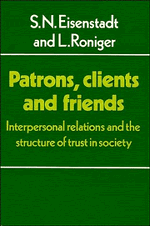Book contents
- Frontmatter
- Contents
- Preface
- 1 PERSONAL RELATIONS, TRUST AND AMBIVALENCE IN RELATION TO THE INSTITUTIONAL ORDER
- 2 THE CONSTRUCTION OF TRUST IN THE SOCIAL ORDER AND ITS AMBIVALENCES: VIEWED FROM THE DEVELOPMENT OF SOCIOLOGICAL THEORY
- 3 THE STRUCTURING OF TRUST IN SOCIETY: UNCONDITIONALITIES, GENERALISED EXCHANGE AND THE DEVELOPMENT OF INTERPERSONAL RELATIONS
- 4 THE BASIC CHARACTERISTICS AND VARIETY OF PATRON–CLIENT RELATIONS
- 5 THE CLIENTELISTIC MODE OF GENERALISED EXCHANGE AND PATRON–CLIENT RELATIONS AS ADDENDA TO THE CENTRAL INSTITUTIONAL NEXUS
- 6 THE SOCIAL CONDITIONS GENERATING PATRON–CLIENT RELATIONS
- 7 VARIATIONS IN PATRON–CLIENT RELATIONS
- 8 RITUALISED INTERPERSONAL RELATIONS; PRIVACY AND FRIENDSHIP
- 9 CONCLUDING REMARKS: THE DIALECTICS OF TRUST AND THE SOCIAL ORDER
- Notes
- Index
Preface
Published online by Cambridge University Press: 01 June 2011
- Frontmatter
- Contents
- Preface
- 1 PERSONAL RELATIONS, TRUST AND AMBIVALENCE IN RELATION TO THE INSTITUTIONAL ORDER
- 2 THE CONSTRUCTION OF TRUST IN THE SOCIAL ORDER AND ITS AMBIVALENCES: VIEWED FROM THE DEVELOPMENT OF SOCIOLOGICAL THEORY
- 3 THE STRUCTURING OF TRUST IN SOCIETY: UNCONDITIONALITIES, GENERALISED EXCHANGE AND THE DEVELOPMENT OF INTERPERSONAL RELATIONS
- 4 THE BASIC CHARACTERISTICS AND VARIETY OF PATRON–CLIENT RELATIONS
- 5 THE CLIENTELISTIC MODE OF GENERALISED EXCHANGE AND PATRON–CLIENT RELATIONS AS ADDENDA TO THE CENTRAL INSTITUTIONAL NEXUS
- 6 THE SOCIAL CONDITIONS GENERATING PATRON–CLIENT RELATIONS
- 7 VARIATIONS IN PATRON–CLIENT RELATIONS
- 8 RITUALISED INTERPERSONAL RELATIONS; PRIVACY AND FRIENDSHIP
- 9 CONCLUDING REMARKS: THE DIALECTICS OF TRUST AND THE SOCIAL ORDER
- Notes
- Index
Summary
The origins of this book go far back to the article on ‘Ritualized Personal Relations’ which I published in 1956 in Man, as an outgrowth of the comparative studies of age groups and youth movements published the same year in From Generation to Generation. For many years after that, while I followed the literature on friendship and interpersonal relations, it was not at the centre of my attention. In 1970 the invitation of Professor E. Leyton to contribute to the volume on Friendship which was based on the colloquium held on the theme at the Memorial University of Newfoundland gave me the first opportunity to rethink some of the theoretical problems involved in these phenomena, and my preliminary musings on these problems were published in the volume of the Symposium.
In the meantime I have become very much interested, as an outgrowth of comparative studies of modernisation, in the analysis of patron–client relations – becoming more and more convinced that such relations are a sign not just of underdevelopment, but of special types of social formations closely related to specific types of cultural orientations.
These problems were analysed in great detail in an inter-disciplinary seminar which I conducted together with Dr Yael Azmon in 1974/5 within the framework of seminars on comparative civilisations at the Hebrew University. One of the major themes worked out in that seminar was that the development of patron–client relations is very closely related to the structure of trust in society; its relevance to the study of interpersonal relations was thus highlighted and many of the assumptions of the earlier works were made explicit.
- Type
- Chapter
- Information
- Patrons, Clients and FriendsInterpersonal Relations and the Structure of Trust in Society, pp. vii - viiiPublisher: Cambridge University PressPrint publication year: 1984
- 1
- Cited by



